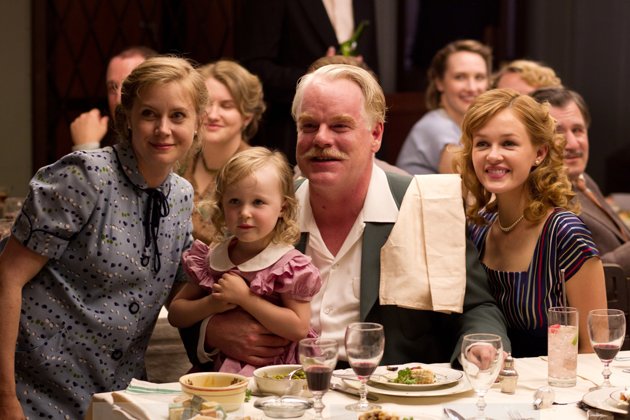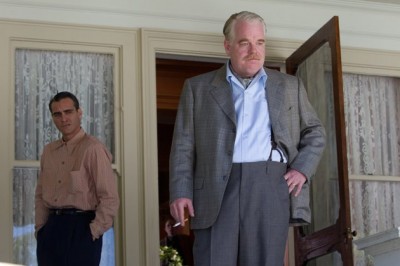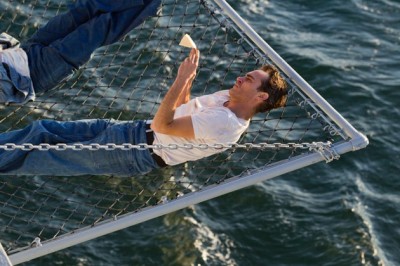
“The Master” — a film review by Gary Chew
The heavyweight films move into place this time of year. Waiting for them, sometimes, makes the summer seem long. Autumn also often brings contention to cinema circles. Negative reactions to Paul Thomas Anderson’s latest film might cause comments such as this, “What? Oh, no. Anderson’s The Master reminds me of Terrence Malick’s The Tree of Life.”
Or maybe this statement could be blurted, “Goodness, has Mr. Anderson done another inaccessible, lugubrious movie like his 2007 film, There Will Be Blood?”
And surely I have to ask, how many quips will ensue on that title (TWBB) invoked by disgruntled film aficionados explaining how much they dislike The Master?

Those sorts of things.
To take sides on this enduring debate: what’s a movie for(?), one must consider the purpose one decides to see a film in the first place. It is to watch girls get almost naked and hear them say words usually written by boys on restroom walls. Is it to see bad guys get the “what for” from Mr. Eastwood or Mr. Wayne? Maybe it’s the desire to really have a big laugh seeing a comedic cast doing a funny script written by someone who knows how to make you giggle.
It seems these are all legitimate reasons for plopping down your money at the picture show.
Other motivations for going to the movies are to drink in, with some amount of awe, the vision of a superior film director and the way in which he or she lays it all out to see: the grand acting; the clever or smart script, the nuances of it; the grandeur, maybe, of computer generated venues or ones that really exist. The buckle and the swash.
Then, in this case, is it the 70mm in which The Master comes to the screen?
Some work hard to raise enough money to make a artful motion picture, all the while, knowing that there’s a good chance his or her labor of love might earn more trophies from off the stage than garner bucks at the box office….or…more unfortunately, not so much of either.
Such a film is called an artistic motion picture, and like other kinds of seriously imagined pieces, can can cause one to keep thinking about it, and asking questions of it the creator might not want to make plain or might not even know.
Many people don’t care for such movies because they’re inaccessible, have a subject foreign to them, or that make them feel uncomfortable.

That about says it for The Master. Anderson’s film doesn’t scream out, “This is entertainment!” It is, as I remarked about “There Will Be Blood,” a movie-going challenge.
The Master unsettles.
Freddie Quell (Joaquin Phoenix) is a disturbed, unstable, alcoholic Naval veteran back from World War II … up to his ass in Post Traumatic Stress Syndrome. Adrift and always on the prowl for private liaison with serial female companions, he happens by a convivial and prosperous-looking group aboard a ship that’s just about to slip from a shore on San Francisco Bay. Freddie stows away on it, and meets its quasi-captain who proves to be the most dynamic man he’ll ever know: Lancaster Dodd (Philip Seymour Hoffman).
Director Anderson has two such male characters in “There Will Be Blood;” Paul Dano, as an ingratiating fundamentalist preacher (somewhat Quell-like) and Daniel Day-Lewis as a power-driven petroleum entrepreneur (indeed, Dodd-like)…though each pair of characters, in other ways, is much different from the pair in the other Anderson film.
Lancaster Dodd is well-off, well-educated and has that sort of proper demeanor you’d expect from a symphony orchestra conductor breezing on stage after the orchestra having just tuned.
Mr. Dodd also has a cause. Moreover, that’s what he calls it: the Cause.
He’s become wealthier through the sale of books he’s written about the Cause, and stirred quite a coterie of serious people to it. It’s the early Fifties and Freddie becomes one of Dodd’s disciples; initially because Freddie can mix the best damn powerhouse libations made of things you’d never dream should be imbibed by man or beast. Lancaster Dodd deems Freddie’s intoxicating concoctions as first rate.
To put it mildly, the circumstances surrounding Dodd’s life and his entourage are suggestible to Scientology which, as most know, is a creation of L. Ron Hubbard, the deceased author of a set of ideas and practices concerning a metaphysical connection between the mind and body: Dianetics.
Scientology has been called (whether it is or not) a religio-secular corporate construct. Some estimates put its current membership between 100,000 and 200,000, a majority of those being US citizens. Another definition for Scientology I’ve read says it’s an intellectually-skewed faith that holds not to spirituality, and that its fundamental good deed is motivating members to keep “processing” to be their best and to feel that new placement of themselves.
How “The Master” will sit with members of the Church of Scientology is not a difficult guess. What is it that arouses more quickly the ire of a devout person to his or her personal beliefs about living — and life itself — than thinking others hold those values in disrespect? All we have to do any given day is following news reports to get the answer … one that we already know.
It’s difficult, though, to figure whether or not the timing of The Master’s release, in the same week as another movie — though artless, trashy and ugly — and now causing reactive violence around the world, is propitious.
Although the Hubbardesque character is not unlike Burt Lancaster’s Elmer Gantry or Andy Griffth’s Lonesome Rhodes, Anderson doesn’t send a message that the affable and charismatic Dodd is really bad. That would make “The Master” not confounding and simple. It is neither.
You have bring yourself to this film, not wait for it to figure out for you what’s going on.
Anderson’s Freddy is really about whom the narrative swirls most. Phoenix’s portrayal of Quell said to me that the actor is overwhelmed and consumed by the character. Hoffman always lets his character take over, even though all of the ones he’s played in movies are a dead ringer for Philip Seymour Hoffman. He always manages to make me forget that anatomical reality.
Amy Adams, another actor endowed with consummate ability, is perfect as Dodd’s wife, Peggy. The sweetness usually seen in Adams’ smile and heard in her voice vanishes in some scenes as she is, after all, Freddie’s fundamental foe due to his alcoholism and simian-like manner, especially when he’s angry with detractors of Dodd’s Cause.
Until near the end of The Master I was unsure whether that was all to Peggy’s growing dislike for Freddie until hearing Lancaster Dodd sing to Freddie Quell, in an unsteady voice, the old favorite, “I’d Love To Get You On A Slow Boat To China.”
Yes, The Master is a work of art: unsettling…and latent.
- Movie Review: ‘The Glorias’ - September 28, 2020
- Movie Review: ‘I’m Thinking of Ending Things’ - September 10, 2020
- Movie Review: ‘The Burnt Orange Heresy’ - August 31, 2020

